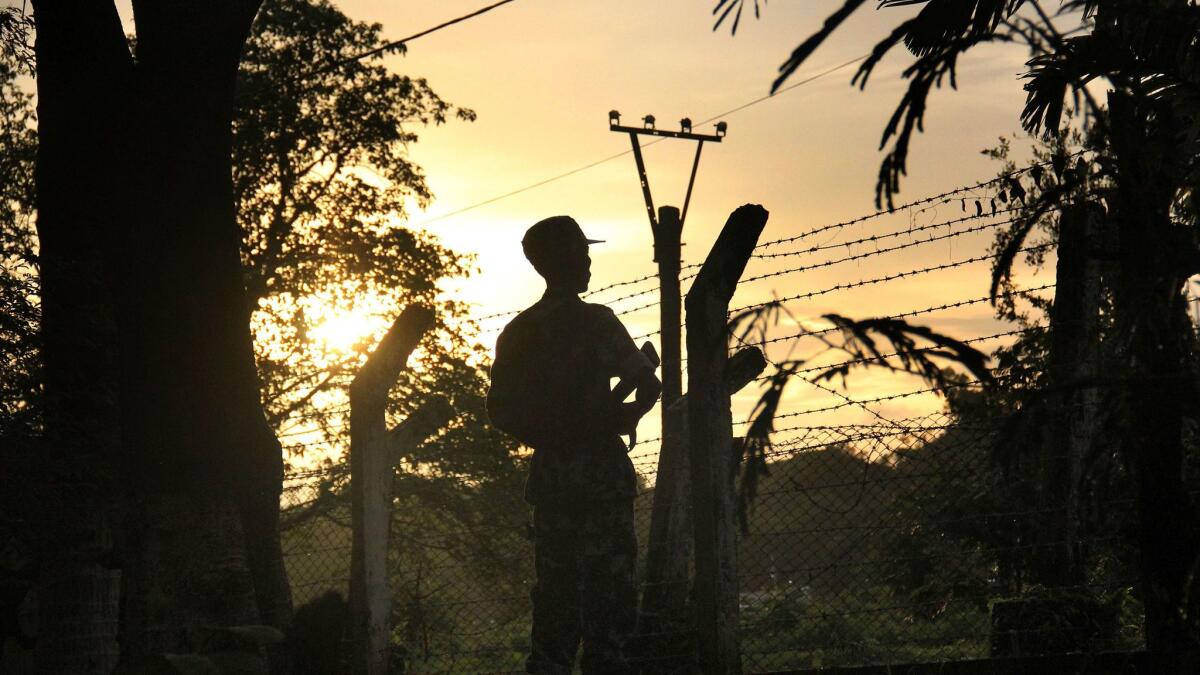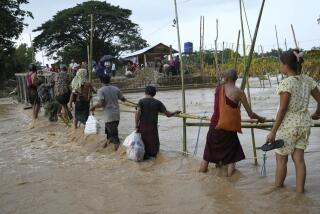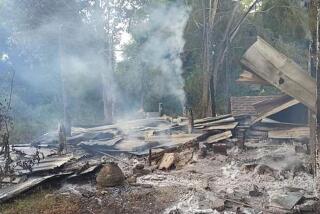71 die in militant attacks on police, border posts in Myanmar

Reporting from YANGON, Myanmar — Ethnic Rohingya militants in western Myanmar launched overnight attacks on more than two dozen police and border outposts, leaving 12 security personnel and 59 Rohingya dead, the government said Friday, in a dramatic escalation of fighting in the troubled region.
The office of the country’s leader, Aung San Suu Kyi, said military and border police responded to the attacks by launching “clearance operations.”
Police fought off groups of as many as 100 Rohingya attackers armed with guns, machetes and homemade grenades. The captured weapons were shown in photos posted online by the government.
A witness in Maungdaw township in Rakhine state, contacted by phone, said soldiers entered her village about 10 a.m. Friday, burned homes and property, and shot dead at least 10 people.
The witness, who asked to be identified by her nickname, Emmar, because of fear of retribution, said villagers fled in many directions but mostly to a nearby mountain range. She said gunshots and explosions could be heard and smoke could still be seen Friday evening.
A militant group, the Arakan Rohingya Salvation Army, or ARSA, took responsibility for the overnight attacks on more than 25 locations, saying they were in defense of Rohingya communities that had been brutalized by government forces. It issued its statement on Twitter on an account deemed legitimate by advocates of Rohingya rights.
Suu Kyi called the attacks “a calculated attempt to undermine the efforts of those seeking to build peace and harmony in Rakhine state.”
The clashes were deadlier than an attack by the militants on three border posts in October that killed nine policemen and set off months of brutal counterinsurgency operations by Myanmar security forces against Rohingya communities in Rakhine state. Human rights groups accused the army of carrying out massive human rights abuses including killing, rape and burning down more than 1,000 homes and other buildings.
The army’s abuses fueled further resentment toward the government among the Muslim Rohingya, most of whom are considered by Myanmar’s Buddhist majority to be illegal immigrants from neighboring Bangladesh and are denied citizenship and its rights. ARSA took advantage of the resentment by stepping up recruitment of members.
The Rohingya have long faced severe discrimination and were the targets of violence in 2012 that killed hundreds and drove about 140,000 people — predominantly Rohingya — from their homes to camps for the internally displaced, where most remain.
According to the United Nations, more than 80,000 Rohingya have fled to Bangladesh since October’s clashes.
Thursday night’s attacks began a few hours after a Rakhine Advisory Commission led by former U.N. Secretary-General Kofi Annan released its final report and recommended that the government act quickly to improve economic development and social justice in Rakhine state to resolve violence between Buddhists and the Rohingya.
Suu Kyi’s office said on its Facebook page that the attacks were intended to coincide with the release of Annan’s report.
ARSA also referred to the report, saying the army in recent weeks had stepped up activity in order to derail any attempt to implement the recommendations.
The announcement from Suu Kyi’s office said 30 police outposts had been attacked. It said in addition to the 12 dead security personnel, 11 people on the government side had been injured, three seriously. It said the attackers had seized six guns. The statement also said the attackers destroyed refugee camps and burned down homes.
The Rakhine Advisory Commission, established in August 2016 at Suu Kyi’s behest, said the situation in Rakhine state is becoming more precarious and requires a sustained and coordinated effort by civilian and military authorities. The commission has six members from Myanmar and three foreigners, including Annan.
“Unless concerted action led by the government and aided by all sectors of the government and society is taken soon, we risk the return of another cycle of violence and radicalization, which will further deepen the chronic poverty that afflicts Rakhine state,” Annan said at a news conference in Yangon to present the report.
On Friday, Annan condemned the new attacks and said he was saddened to hear about the loss of life among security forces.
“The alleged scale and gravity of these attacks mark a worrying escalation of violence. No cause can justify such brutality and senseless killing. Perpetrators should be held to account. I urge the security forces to exercise restraint in dealing with the situation and above all ensure that innocent civilians are not harmed.
“After years of insecurity and instability, it should be clear that violence is not the solution to the challenges facing Rakhine state,” he said.
UPDATES:
11:11 a.m.: This article was updated with additional details.
This article was originally published at 4:55 a.m.
More to Read
Sign up for Essential California
The most important California stories and recommendations in your inbox every morning.
You may occasionally receive promotional content from the Los Angeles Times.










